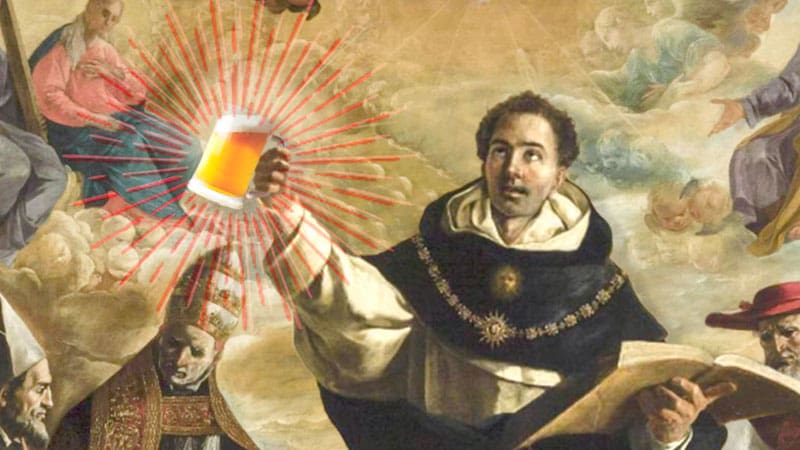Thanks for listening!
Please support me on Patreon (Thank you!) here.
Check out that photo of me and Br. Joseph here.
Here’s the text I read from the Summa II-II, Q.2 (articles 1,2, and 3).
I answer that, “To think” can be taken in three ways. First, in a general way for any kind of actual consideration of the intellect, as Augustine observes (De Trin. xiv, 7): “By understanding I mean now the faculty whereby we understand when thinking.” Secondly, “to think” is more strictly taken for that consideration of the intellect, which is accompanied by some kind of inquiry, and which precedes the intellect’s arrival at the stage of perfection that comes with the certitude of sight. On this sense Augustine says (De Trin. xv, 16) that “the Son of God is not called the Thought, but the Word of God. When our thought realizes what we know and takes form therefrom, it becomes our word. Hence the Word of God must be understood without any thinking on the part of God, for there is nothing there that can take form, or be unformed.” In this way thought is, properly speaking, the movement of the mind while yet deliberating, and not yet perfected by the clear sight of truth. Since, however, such a movement of the mind may be one of deliberation either about universal notions, which belongs to the intellectual faculty, or about particular matters, which belongs to the sensitive part, hence it is that “to think” is taken secondly for an act of the deliberating intellect, and thirdly for an act of the cogitative power.
Accordingly, if “to think” be understood broadly according to the first sense, then “to think with assent,” does not express completely what is meant by “to believe”: since, in this way, a man thinks with assent even when he considers what he knows by science [Science is certain knowledge of a demonstrated conclusion through its demonstration.], or understands. If, on the other hand, “to think” be understood in the second way, then this expresses completely the nature of the act of believing. For among the acts belonging to the intellect, some have a firm assent without any such kind of thinking, as when a man considers the things that he knows by science, or understands, for this consideration is already formed. But some acts of the intellect have unformed thought devoid of a firm assent, whether they incline to neither side, as in one who “doubts”; or incline to one side rather than the other, but on account of some slight motive, as in one who “suspects”; or incline to one side yet with fear of the other, as in one who “opines.” But this act “to believe,” cleaves firmly to one side, in which respect belief has something in common with science and understanding; yet its knowledge does not attain the perfection of clear sight, wherein it agrees with doubt, suspicion and opinion. Hence it is proper to the believer to think with assent: so that the act of believing is distinguished from all the other acts of the intellect, which are about the true or the false. (Article 1)
I answer that, The act of any power or habit depends on the relation of that power or habit to its object. Now the object of faith can be considered in three ways. For, since “to believe” is an act of the intellect, in so far as the will moves it to assent, as stated above (Article 1, Reply to Objection 3), the object of faith can be considered either on the part of the intellect, or on the part of the will that moves the intellect.
If it be considered on the part of the intellect, then two things can be observed in the object of faith, as stated above (II-II:1:1). One of these is the material object of faith, and in this way an act of faith is “to believe in a God”; because, as stated above (II-II:1:1) nothing is proposed to our belief, except in as much as it is referred to God. The other is the formal aspect of the object, for it is the medium on account of which we assent to such and such a point of faith; and thus an act of faith is “to believe God,” since, as stated above (II-II:1:1) the formal object of faith is the First Truth, to Which man gives his adhesion, so as to assent to Its sake to whatever he believes.
Thirdly, if the object of faith be considered in so far as the intellect is moved by the will, an act of faith is “to believe in God.” For the First Truth is referred to the will, through having the aspect of an end. (Article 2)
I answer that, Wherever one nature is subordinate to another, we find that two things concur towards the perfection of the lower nature, one of which is in respect of that nature’s proper movement, while the other is in respect of the movement of the higher nature. Thus water by its proper movement moves towards the centre (of the earth), while according to the movement of the moon, it moves round the centre by ebb and flow. On like manner the planets have their proper movements from west to east, while in accordance with the movement of the first heaven, they have a movement from east to west. Now the created rational nature alone is immediately subordinate to God, since other creatures do not attain to the universal, but only to something particular, while they partake of the Divine goodness either in “being” only, as inanimate things, or also in “living,” and in “knowing singulars,” as plants and animals; whereas the rational nature, in as much as it apprehends the universal notion of good and being, is immediately related to the universal principle of being.
Consequently the perfection of the rational creature consists not only in what belongs to it in respect of its nature, but also in that which it acquires through a supernatural participation of Divine goodness. Hence it was said above (I-II:3:8) that man’s ultimate happiness consists in a supernatural vision of God: to which vision man cannot attain unless he be taught by God, according to John 6:45: “Every one that hath heard of the Father and hath learned cometh to Me.” Now man acquires a share of this learning, not indeed all at once, but by little and little, according to the mode of his nature: and every one who learns thus must needs believe, in order that he may acquire science in a perfect degree; thus also the Philosopher remarks (De Soph. Elench. i, 2) that “it behooves a learner to believe.”
Hence in order that a man arrive at the perfect vision of heavenly happiness, he must first of all believe God, as a disciple believes the master who is teaching him. (Article 3)



Reader Interactions